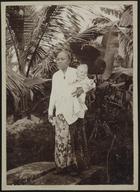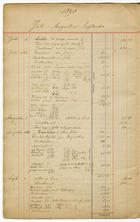Theo Juijnboll (1866-1948) was an Arabist and Professor of Arabic and Hebrew at Leiden and Utrecht universities. In 1896 he and his wife Elly went to Malang, in the Dutch East Indies, and their daughter Minneke, named after Queen Wilhelmina, was born there in 1898.
 Who knows? Perhaps Theo and Elly were acquainted with Margaretha Zelle, who was living in Malang with her much older husband at that time and who, like Elly, had a daughter in 1898.
Who knows? Perhaps Theo and Elly were acquainted with Margaretha Zelle, who was living in Malang with her much older husband at that time and who, like Elly, had a daughter in 1898.
Even in those days, Margaretha Zelle went under the name “Mata Hari”.
The birth of a child cost 126 guilders for “physician and dukun [midwife]” and four guilders for the birth certificate.
And the couple now needed an amah to raise the child. In 1899 the Juijnbolls returned to the Netherlands, taking the amah with them.
 It was not the family’s intention to retain her though.
It was not the family’s intention to retain her though.
Back in the Netherlands an advertisement was placed in the paper: “Amah available for family heading for the Indies”. The woman was given a send-off at the port of Rotterdam.
This was a common arrangement in those days.
Amahs were sent to and fro like parcels; in the classified ads, their employers sometimes even boasted that their amah was never seasick.
 The monthly salary of the Juijnboll family in the Indies was 250 guilders; they also received a substantial grant towards the cost of relocating.
The monthly salary of the Juijnboll family in the Indies was 250 guilders; they also received a substantial grant towards the cost of relocating.
The journey from Leiden to Batavia cost 1,710 guilders, tips for coachmen and carriers excluded.
They furnished their home in Malang with “Japanese rugs” (50.20 guilders) and furniture bought from “Chinese 1” and “Chinese 2” (415.35 guilders).
About fifteen per cent of their monthly income was spent on servants.
Description of the Juijnboll Collection
Calculating Tool Value of the Guilder
